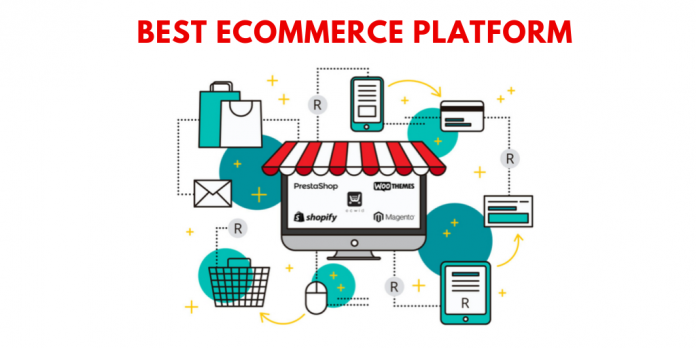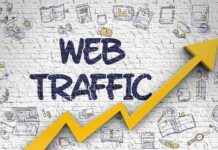eCommerce is the future. There are no two ways about it.
Every other business is online now and those that aren’t are losing out on sales. Moreover, with the advent of eCommerce giants like Amazon, it’s becoming easier to get your website up and running as an eCommerce store than ever before. Not only this but there has been a massive surge in cross-platform compatibility which has led to the rise of mobile commerce. This is another reason why you need to think about eCommerce and selling products online.
But, if you’re just thinking about starting an eCommerce website, there are some things that you should know first-off. The key is to start small and scale large later on.
What’s the first thing you need to do? Most people will think of finding the right product or supplier but there’s something you need to do even before that. And that is to choose the right platform.
Popular eCommerce platforms:
Here’s a list of some popular eCommerce platforms and how they stack up against each other.
Magento:
Magento is an open-source platform which means that it has no license fees attached to it unlike the likes of Shopify Plus or Bigcommerce. It does have its challenges though in terms of SEO optimization as well as speed.
Yo!Rent:
Yo!Rent is an eCommerce marketplace solution built by FATbit Technologies. Along with conducting sales operations, it can be used for conducting rental operations with meaningful and well planned features like rental security management, document verification, rental add-ons and late return/cancellation charges. Yo!Rent online rental software also supports unlimited listings and transactions.
Yo!Kart:
Yo!Kart is an online multivendor marketplace software for building eCommerce websites like Amazon, Etsy, or even Alibaba.com. It is feature-extensive and comes populated with all essential modules to start your online marketplace swiftly. It is a self-hosted solution with a one-time fee and source code ownership.
Growcer:
Growcer is a readymade eCommerce grocery software that is fully customizable for entrepreneurs and merchants who are looking to launch their grocery business online. It is a feature-rich platform that encapsulates all essential modules for swift operations. Robust mobile apps for buyers and delivery staff (iOS and Android) are also provided.
Shopify:
Shopify is one of the most talked-about eCommerce platforms. It has a good number of features like SEO optimization and scalability. It also allows one to dropship products. On Shopify itself, dropshippers will buy them from third parties and ship them directly to customers. This means the seller does not have to be directly involved with the product. 3PL fulfillment for Shopify is a service that allows businesses to outsource the storage, packing, and shipping of products to a third-party logistics (3PL) provider. This allows Shopify merchants to focus on other aspects of their business while the 3PL provider handles the logistics. The 3PL provider receives the orders, picks and packs the products, and ships them to customers on behalf of the merchant. The integration between Shopify and the 3PL provider allows for seamless order management and tracking. Overall, 3PL fulfillment can help Shopify merchants streamline their operations and improve their customer service.
Sellosity:
This is a new entry. You might be surprised by this name but it is a good one. It comes with a drag and drop, instant store builder. It also comes with extensive eCommerce training, which is great. Here’s a detailed Sellosity review to give you a better idea.
Bigcommerce:
Bigcommerce offers some good eCommerce features and also provides great analytical insights into your store through its user-friendly dashboard interface.
WooCommerce:
WooCommerce is a great platform to run your online store on as it’s completely free of cost and is a great open-source solution. One downside that you need to consider, however, is that the learning curve for WooCommerce can be somewhat difficult at first especially if you want custom solutions.
Weebly:
Weebly has a very simple drag and drop platform. It has a good feature set and is a great platform for those looking to sell online with an easy-to-use interface.
Now, when it comes to choosing the right eCommerce platform, your decision will depend on what exactly you have in mind. Plus, you need to take into account your budget as well as the features that you want.
Here’s what you need to consider when choosing the right one:
Pricing and Cost:
Although they are all affordable, there are considerable differences in pricing across the board. While Shopify Plus is the most expensive, Bigcommerce charges only a percentage of your sales volume as its fee.
Growth Potential:
This depends on how well-versed you are at creating stores from scratch and running them successfully. Magento has the upper hand in this regard.
SEO:
SEO is crucial for online sales and all the platforms have their strengths and weaknesses here. For instance, Shopify might be great for your store but it is weak on SEO features whereas Weebly lacks in customizability. As such, WooCommerce has a good mix of both along with extensive integrations and features.
Customizability:
This is where Magento stands out as it offers a great deal of customizability in terms of themes, extensions, etc. You can also integrate third-party plugins with WooCommerce and Bigcommerce which might be necessary for your store.
User Experience:
The platform you use must have a great user interface. Otherwise, it will be difficult for you to run your store effectively. It also matters how much time you invest in becoming familiar with the platform and its features. As such, Weebly is a winner here since it’s super easy to use.
Customer support: This category goes to Bigcommerce and Shopify Plus. Both provide great customer support to their users.
Security:
Magento is a good option when it comes to security. It has multiple layers of security to ensure complete safety for your store and customers.
Mobile-friendliness:
This is a very important criterion and all the sites have this covered well. You can access Shopify, BigCommerce, Weebly, or WooCommerce on your mobile phones easily via their free mobile apps.
Speed:
This is a crucial factor for your store’s success since if it doesn’t load quickly, you’ll lose customers. Both Shopify and Bigcommerce are known to be speed demons with blazing fast speeds so we’re going with them here.
It can be a hard choice to make. And there might be many other factors that come into play based on your needs and requirements. For example, Shopify doesn’t have a proper withdrawal method in some countries so you will have to choose something like WooCommerce.
The above-mentioned points will give you a better understanding of what matters the most in this regard. You can also go through some reviews for each of the platforms to understand what they deal in and how good their services are.
Read Also : What Can Magento SEO Do For Your Magento eCommerce Store



































































